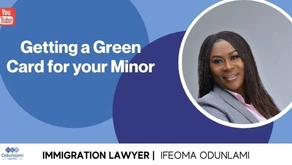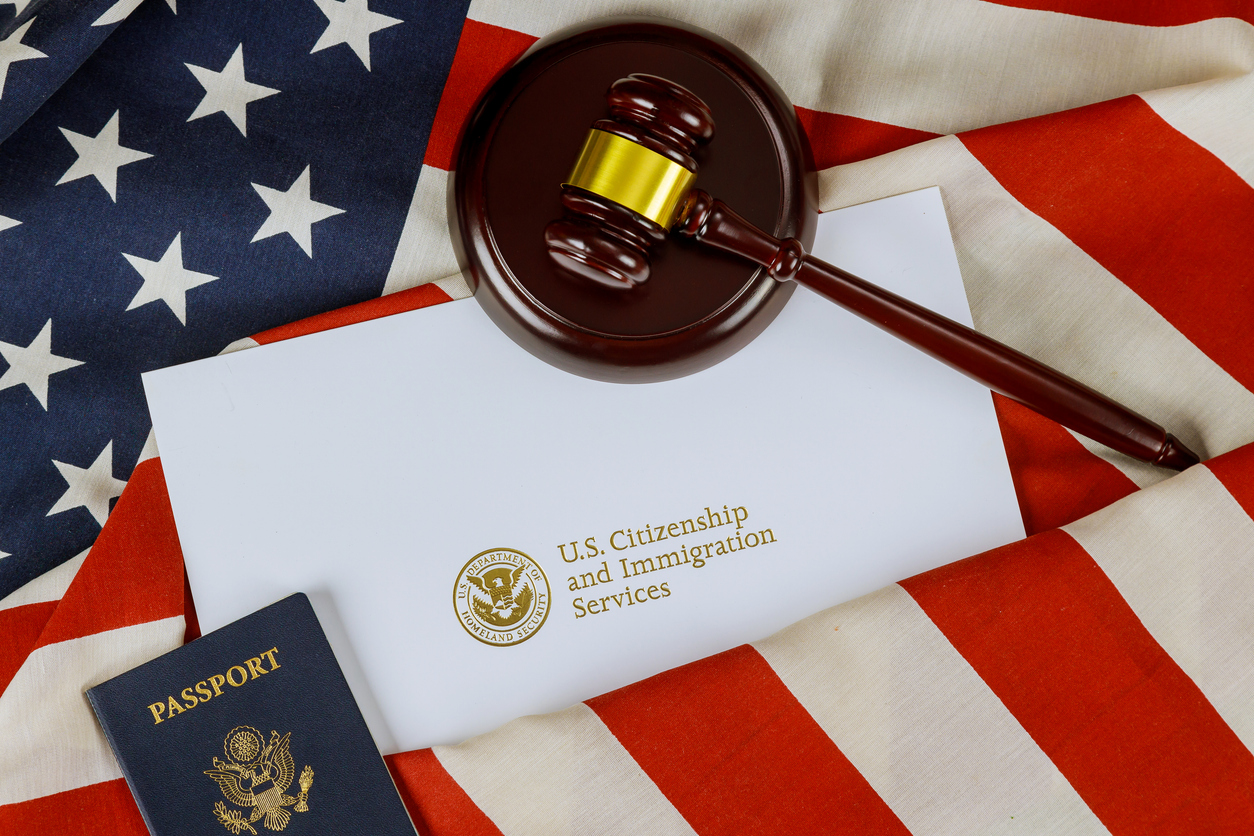Transcript
Ifeoma Odunlami:
Hello, everyone. This is Ifeoma Odunlami from the Odunlami Law Firm, and this is Tonia, also from the Odunlami Law Firm.
Ifeoma Odunlami:
So, for those that don’t know me, I’m an immigration attorney and I’m also an immigrant. So, like you, I came into this country looking to get my American dream, and I have it. I’m a US citizen, and so is my family. So, our passion at the Odunlami Law Firm is to help fellow immigrants get their American dream.
Ifeoma Odunlami:
So, at least once a week I come onto Facebook Live and YouTube to give you information to empower you as an intended immigrant so that you know what options are available to you. And so, the information does not take the place of a proper consultation because I don’t know your particular story, so this broadcast is really for informational purposes only. So, if I’m giving too much information at one time tell me, Tonia. Okay?
Tonia:
I’m okay right now.
Ifeoma Odunlami:
So, today, I have a great topic, and this has to do with children. Children. This is what we’re going to talk about. Getting Green Cards for children. So, what we’re talking about is called Special Immigrant Juvenile Status. Okay. So, I want to talk about the people, the children that qualify for it and walk you through some of the processes.
Ifeoma Odunlami:
So, to qualify for SIJS, which is also… That’s the acronym for Special Immigrant Juvenile Status. You have to present in the United States. You have to be unmarried. You have to be under the age of 18 in some states or 21 in others. In New Jersey, it’s 21. And then the next thing you have to show is that you’ve been abused, abandoned, or neglected by either one parent or both parents.
Ifeoma Odunlami:
So, now I want to clarify that requirement of one or both parents. I want to make sure you understand that it doesn’t have to be both parents that have either abused, abandoned, or neglected. It can be only one parent. Okay? And that behavior there, abandonment, the abuse, or the neglect can happen in your country. It doesn’t have to have happened in the United States.
Ifeoma Odunlami:
So, let’s talk about people that can get… who this relief is available for. If you’re an unaccompanied minor, you came through the border, you can file stage to get a Green Card if you meet the other guidelines I have talked about. And sometimes unaccompanied minors, they come alone or with one parent or they’re coming here to meet another parent. So, it’s okay if one parent is really great, as long as the other parent has either abandoned, abused, or neglected you.
Ifeoma Odunlami:
Okay, so now another group of people that this immigration benefit could accrue to are people who are here on a visa. So, the visa could be current or the visa could be expired. Okay. And another group of people that this can really help are children who are in deportation proceedings. So, unfortunately, in immigration court there’s not a separate court for children, so often you see children having to fight against deportation by themselves. So, if that child is in deportation proceedings currently, SIJ is a way to get them out of being deported if they qualify.
Ifeoma Odunlami:
Okay, so now let’s talk about the different bases of the abuse, the abandonment, and the neglect. So, I’m going to start with abuse. So, abuse, abandonment, or neglect differ from state to state because that’s determined by state law. So, there’s another basis called similar basis under… What’s this? Similar basis under the law. And-
Ifeoma Odunlami:
Oh, go ahead. Mm-hmm (affirmative).
Tonia:
Sorry.
Ifeoma Odunlami:
And this basically allows states to… Basically, it allows states to have other reliefs or other reasons for removing a child from a parent custody, which is not abuse, abandonment, or neglect. So, it gives them another reason… I mean another basis. Okay? Do you understand what I’m saying, Tonia?
Tonia:
Yeah.
Ifeoma Odunlami:
For instance, if there’s a child who qualifies for… but who has not been abused, abandoned, or neglected, say a child who has mental health issues but there is no abuse, abandonment, or neglect, that child could qualify for SIJ if they meet the other criteria. So, going back to abuse, what do we mean by abuse? So, typically, abuse comes under domestic abuse, like beating a child, verbal abuse, castigating a child in a cruel manner. That kind of stuff. So, let’s talk about… I mean, there are other types of abuse, but I just want to go through them really quickly just so we can get everything within the half-hour.
Ifeoma Odunlami:
So, now let’s talk about abandonment. Abandonment could be a parent that never had any relationship with the child. Abandonment could also be death. In New Jersey, the death of a parent is abandonment. So, moving to the next one, which is neglect. Neglect is the failure of a parent to provide for a child, such as food, clothing, and basic resources. Abandonment could also… Sorry. Neglect could also be putting a child in a dangerous situation.
Ifeoma Odunlami:
Right. So, if you qualify with all the criterias we’ve talked about, SIJ could be an option for your child. And the good thing about SIJ is that SIJ does not care how you came into the country, whether you came in with a visa or whether your visa is expired. None of those matter. And unlike other pathways to citizenship, SIJ does not require you to show that you can support yourself in the United States.
Ifeoma Odunlami:
Right, so the SIJ process is three parts. So, the first part takes place in family court where you have to get a custodian, could be your parent or family member or a friend, seeks guardianship. And once we get the order from the court establishing that then we file the SIJ petition with the USCIS. I’m sorry, I’m… Okay, so and then the third stage is when the SIJ petition is approved then we apply for the adjustment of status to get you the Green Card. And once you get the Green Card, it’s a 10-year Green Card.
Ifeoma Odunlami:
So, let me answer some of the questions on the comment section. So, LaMonica, hi. LaMonica says, “Hello. I’m looking forward to our Zoom meeting.” So am I, LaMonica. You can translate that. And the next comment is from Makan Traore, who says, “I filed for VAWA and I-485. I-360 was approved in 2018, but I have a deportation order from my asylum in 2011, and my motion to reopen was denied in 2019. USCIS just sent me a medical examination request.” Can you translate? [crosstalk 00:20:25]
Tonia:
I’m going to try. I don’t know how to say motion.
Ifeoma Odunlami:
Say something like the request. Request of the court is a motion. Yeah.
Tonia:
Okay.
Ifeoma Odunlami:
So, Makan, I would need to know why your motion to reopen was denied so I could assist you. We do a lot of motions to reopen based on an approved I-360, so we could assist you, but I need to get more information and I would suggest you contact my office for a proper consultation.
Ifeoma Odunlami:
All right, so it’s been a pleasure hanging out with you guys. So, if you or somebody you know needs immigration assistance feel free to call my office. 973-993-1900. And even though we’re in New Jersey, because immigration law is federal law we have clients from all 50 states of the United States. So have a wonderful weekend, everybody, and thank you for translating, Tonia. We’re going to be jumping off now.
Subscribe to our newsletter
Are you looking for immigration services or more information regarding your fiancé visa or marriage-based green card? We can help.
Contact the Odunlami Law Firm at 973-993-1900 or email us iao@odunlamilaw.com
If you need an employment visa, wish to immigrate, or want to help bring a family member to the United States, a green card lawyer from Odunlami Law Firm can help. If you are facing deportation or removal for any reason, you need our help. You may contact the law office for more information or to schedule an appointment.
Areas of Immigration Law:
- Naturalization (Citizenship) Application
- Immigrant Relative Petitions
- Fiancé Visa Applications
- Adjustment of Status and Consular Processing
- Criminal Consequences and Deportation Defense
- Violence Against Women Act (VAWA) Application
- Special Immigrant Juvenile Status
- Green Card Renewals
- Temporary Work Visas
- Temporary Protected Status
- Deferred Action for Childhood Arrivals
- Waivers



